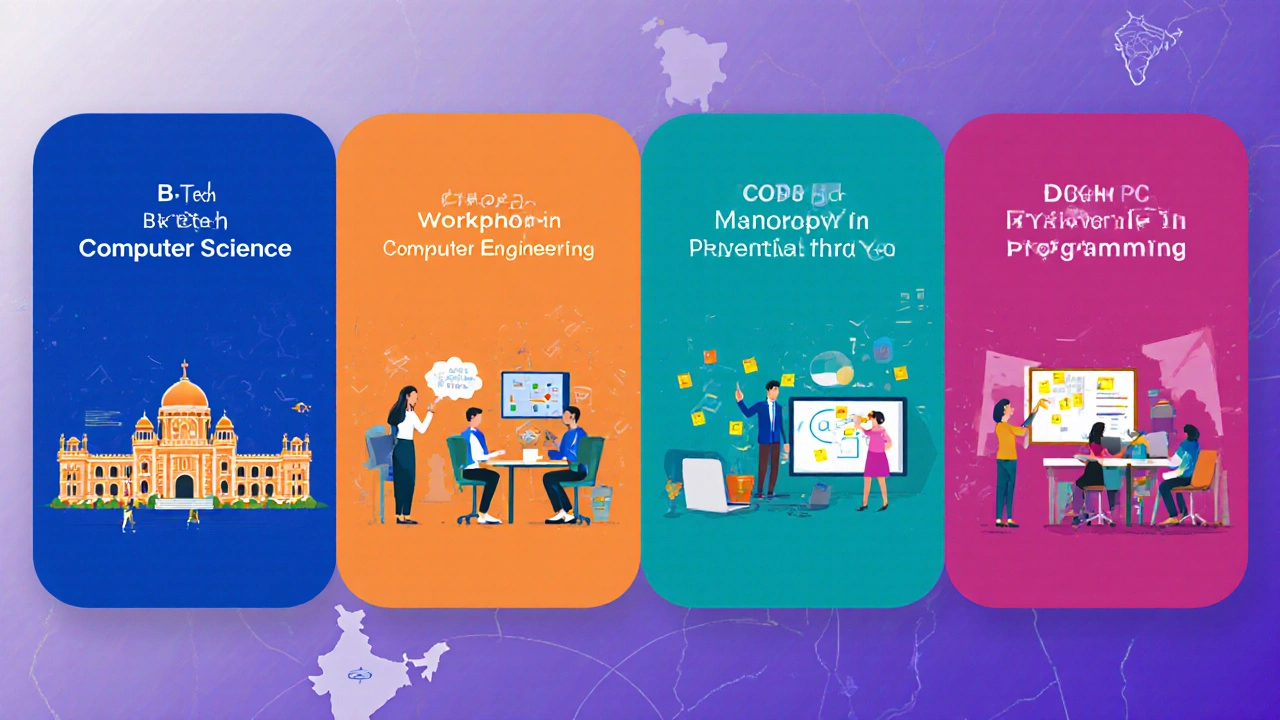Computer Science Readiness Assessment
How ready are you for a Computer Science course?
This assessment helps you understand if you're prepared for the challenges of a Computer Science program. Based on your answers to 5 key questions, you'll get personalized feedback and tips to improve your readiness.
1. Do you enjoy solving puzzles or logical games?
Examples: Sudoku, chess, coding challenges on HackerRank or Codeforces.
2. Are you comfortable with basic algebra and graphs?
Examples: Solving equations, understanding linear relationships, interpreting graphs.
3. Can you allocate 10-15 hours per week for practice?
This is crucial for developing programming skills.
4. Do you have reliable internet access for online labs and tutorials?
5. Are you ready to embrace the challenge?
Computer Science requires persistence and a growth mindset.
Your Computer Science Readiness Assessment
Enter your answers above to see your personalized assessment.
Ever caught yourself wondering if a Computer Science Course is a hard program that demands endless coding nights and complex math? You’re not alone. In India, the buzz around tech careers makes many ask the same question, and the answer isn’t a one‑size‑fits‑all. Let’s break down what really makes a computer course tough, how different pathways compare, and what you can do to turn difficulty into advantage.
What Defines the Difficulty of a Computer Course?
Difficulty isn’t just about the number of assignments; it’s a mix of content depth, teaching style, and your own background. Three core factors shape the perceived computer course difficulty:
- Conceptual load: Courses that dive deep into theory-like algorithms or operating systems-require abstract thinking.
- Practical workload: Labs, projects, and hackathons add a hands‑on burden that can overwhelm newcomers.
- Prerequisite knowledge: Strong maths or logic foundations make the learning curve smoother.
Understanding these pillars helps you see whether the challenge comes from the curriculum itself or a mismatch with your skill set.
Common Types of Computer Courses in India
India offers a spectrum of computer education, each with its own intensity level. Below is a quick snapshot of the most popular routes.
| Path | Typical Duration | Eligibility | Average Salary (First 2 Years) | Perceived Difficulty |
|---|---|---|---|---|
| B.Tech Computer Science - a four‑year undergraduate degree. | 4 years | 12th pass, JEE Main/State entrance | ₹5‑7Lakh per annum | High - heavy theory + extensive projects |
| Diploma in Computer Engineering | 3 years | 10th/12th pass, state entrance | ₹3‑4Lakh per annum | Medium - practical focus, less theory |
| Certificate in Programming - short‑term skill course. | 6‑12 months | Open, basic math | ₹2‑3Lakh per annum (entry‑level) | Low to Medium - intensive but narrow scope |
| Coding Bootcamp - immersive, industry‑driven. | 3‑6 months | Open, aptitude test | ₹3‑6Lakh per annum (junior dev) | Medium - fast paced, project heavy |
Notice how the “Perceived Difficulty” column aligns with the mix of theory and practice. If you thrive on hands‑on coding, a bootcamp or certificate might feel easier than a full‑blown B.Tech.
Typical Challenges Students Face
Regardless of the path, most learners bump into a few recurring hurdles:
- Mathematical Foundations: Topics like discrete mathematics, probability, and linear algebra underpin Data Structures and Algorithms. Weakness here makes debugging feel like guesswork.
- Logical Thinking: Translating a problem statement into code requires step‑by‑step reasoning-a skill that develops with practice.
- Time Management: Semester‑long projects, lab reports, and frequent quizzes can clash with part‑time jobs or family duties, especially for students from tier‑2 and tier‑3 cities.
- Keeping Up with Technology: The IT industry evolves fast. What you learned in the first semester might feel outdated by the final year.
Identifying which of these spikes for you is the first step toward a tailored study plan.

Self‑Assessment: Am I Ready for a Computer Course?
Before you enroll, ask yourself these quick questions:
- Do I enjoy solving puzzles or logical games? (Think of Sudoku, chess, or coding challenges on platforms like HackerRank.)
- Am I comfortable with basic algebra and graphs?
- Can I allocate at least 10‑15 hours per week for practice?
- Do I have a reliable internet connection for online labs and tutorials?
If you answer “yes” to most, you’re likely a good fit. If not, consider a short‑term certificate to build confidence before tackling a degree.
Pro Tips to Tackle the Difficulty Head‑On
Here’s a toolbox of strategies that work for Indian students across all formats:
- Start with Foundations: Use free resources like GeeksforGeeks or Coursera to solidify maths and basic programming concepts.
- Practice Daily: Write at least one small program every day-whether it’s a “Hello World” in a new language or a simple sorting algorithm.
- Join Study Groups: Campus clubs, WhatsApp cohorts, or Discord servers provide peer support and quick answers to roadblocks.
- Leverage Open‑Source Projects: Contribute to GitHub repositories; real‑world code exposes you to best practices and version control.
- Use the “Pomodoro” Technique: 25‑minute focused coding bursts followed by short breaks boost retention.
- Seek Mentorship: A senior student or industry professional can guide you through interview prep and project selection.
Apply these habits early, and the perceived difficulty drops dramatically as confidence builds.

Real‑World Outcomes: Does the Hard Work Pay Off?
Data from the National Skill Development Corporation (NSDC) 2024 report shows that graduates of computer courses enjoy a 35% higher placement rate than non‑technical peers. Average starting salaries for B.Tech CS graduates sit around ₹6Lakh, while bootcamp alumni report median salaries of ₹4.5Lakh after six months of work.
Success stories abound. Consider Priyanka from Jaipur, who completed a three‑month Coding Bootcamp, landed a junior developer role at a fintech startup, and now mentors newcomers through her own YouTube channel. Or Ankit, a B.Tech CS graduate from Kerala, who struggled with algorithms in the 2nd year but turned that weakness into a strength by joining a campus Software Development Club and eventually secured a placement with a multinational corporation.
The common thread? Persistence, structured practice, and leveraging the right resources.
Frequently Asked Questions
Frequently Asked Questions
Is a B.Tech in Computer Science harder than a Diploma?
Yes, the B.Tech program usually covers deeper theoretical concepts like compiler design, advanced algorithms, and research projects, making it more demanding. The Diploma focuses more on practical skills and has a shorter duration, so the workload feels lighter.
Can I switch from a Certificate course to a full degree later?
Most Indian universities allow credit transfer if you have completed a recognized certificate in programming or related subjects. You’ll still need to meet the eligibility criteria for the degree, but the transition is feasible.
What maths topics should I master before starting?
Focus on discrete mathematics (sets, relations, graphs), basic probability, and linear algebra. These subjects form the backbone of data structures, algorithms, and machine learning basics.
Are online bootcamps as effective as campus programs?
Effectiveness depends on your discipline and the bootcamp’s curriculum. Top‑rated Indian bootcamps partner with industry mentors and offer real‑world projects, which can match or even surpass traditional classroom experiences.
How long does it usually take to become job‑ready?
With a focused 6‑month bootcamp plus a strong portfolio, many students land junior roles within 3‑4 months after graduation. A full B.Tech may take 1‑2 years post‑graduation to secure a comparable position, largely due to the broader academic timeline.
Bottom line: yes, computer courses can be tough, but the difficulty is manageable with the right preparation and mindset. Choose a path that aligns with your learning style, and turn the challenge into a stepping stone toward a rewarding tech career.
